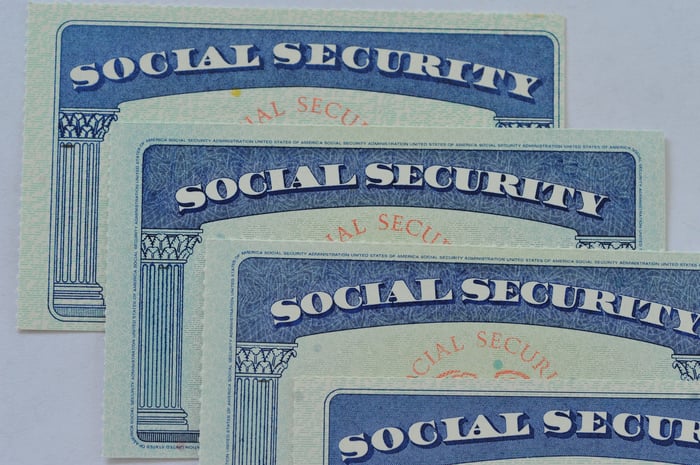Many seniors count on Social Security to pay the bills, and chances are, you'll do the same. But did you know that Social Security is subject to taxes? It's a rule that tends to catch recipients off guard. That said, there are steps you can take to avoid losing a chunk of your benefits to taxes -- and keep more of that money for yourself.
1. House your retirement savings in a Roth IRA
Your provisional income will dictate whether your Social Security benefits will be taxed. That income is derived by taking 50% of your annual benefit amount and adding it to your non-Social Security income, which may include retirement plan withdrawals.

Image source: Getty Images.
If your provisional income totals $25,000 to $34,000 and you're single, you'll face taxes on up to 50% of your benefits. The same holds true if your provisional income totals $32,000 to $44,000 and you're married. Beyond these thresholds, you risk taxes on up to 85% of your benefits.
Delaying retirement plan withdrawals can help keep your provisional income low, thereby avoiding taxes. But once you turn 72, you'll need to start thinking about required minimum distributions, or RMDs, which could push you over the above limits. On the other hand, if you save for retirement in a Roth IRA, you won't have to worry about RMDs. Furthermore, Roth IRA withdrawals are yours to enjoy tax-free, and they don't even count toward provisional income in the first place, so even if you choose to remove funds from your Roth IRA, they won't work against you.
2. Move to a state that doesn't tax benefits
The aforementioned provisional income limits apply to taxes on Social Security at the federal level. But there are 13 states that tax Social Security as well:
- Colorado
- Connecticut
- Kansas
- Minnesota
- Missouri
- Montana
- Nebraska
- New Mexico
- North Dakota
- Rhode Island
- Utah
- Vermont
- West Virginia
Now most of these states do offer an exemption for lower earners, and some offer a low enough cost of living that they're worth moving to for your senior years, even if it means taking a hit on your Social Security income. But it's important to keep these 13 states on your radar if you're worried about losing a chunk of your benefits.
3. Hold off on filing until you're no longer working
Because you can claim Social Security as early as age 62, albeit at a reduced rate, it's feasible that you may end up collecting benefits before you're actually retired. But remember, any income you receive will increase your chances of having your benefits taxed, so if you're planning to leave your job at, say, age 65, you may want to hold off on claiming your benefits until then. Doing so will also help minimize the hit you'll take on your benefits by filing early.
Taxes in retirement can be a major drag, especially when you're trying to adjust to living on a fixed income. Unfortunately, Social Security benefits do have the potential to be taxed, but if you play your cards right, you may be able to keep that money out of the IRS's reach.




